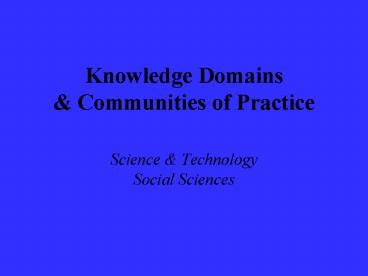Knowledge Domains - PowerPoint PPT Presentation
Title:
Knowledge Domains
Description:
Realist nature of knowledge: world is completely objective (pure realism) ... and human behavior, genetics, race and IQ, psychobiology, or sociobiology) ... – PowerPoint PPT presentation
Number of Views:82
Avg rating:3.0/5.0
Title: Knowledge Domains
1
Knowledge Domains Communities of Practice
- Science TechnologySocial Sciences
2
the nature of knowledge
realist
social
3
Science TechnologySocial Sciences
- Realist nature of knowledge world is completely
objective (pure realism) - Social nature of knowledge there is no
foundation to knowledge apart from the perception
of humans (purely socially determined)
4
- science objectively establishes truth, but does
not control the context in which the scientific
discovery will assist in the creation of
knowledge
5
Science TechnologySocial Sciences
- If scientific truth is objective, it is also
blind because it ignores the social context in
which knowledge is circulated - How individuals beliefs are formed is based on
information supplied by others - social nature of knowledge
- may be contentious regarding the nature of
truth
6
Science TechnologySocial Sciences
- Scientific data may be used / misused
- to justify social stratification and prejudice
- so that certain groups will appear to be inferior
(e.g. behavioral research, studies of heredity
and human behavior, genetics, race and IQ,
psychobiology, or sociobiology)
7
Science TechnologySocial Sciences
- S/R Standards of evidence are not hopelessly
culture-bound, though judgements of justification
are always perspectival (e.g. knowledge is
truth-indicative but not absolute) - Knowledge is built through the perspectives of
disciplines (processes of cultural selection,
institutional arrangements that shape knowledge)
8
Science TechnologySocial Sciences
- Important to understand how disciplines structure
knowledge - Disciplinary domains are formed by communities
of practice - how do they circulate information?
- what are the rules of engagement?
- need to recognize the social structure of research
9
Science TechnologySocial Sciences
- Knowledge entails cognitive effort within
communities - Communities form consensus based on
- attribution of authority
- division of opinion
10
Science TechnologySocial Sciences
- Knowledge claims form an important part of
journals content - Knowledge claims based on
- Epistemology logical argument, testimony,
empirical evidence - Rhetoricpersuasion
11
Science TechnologySocial Sciences
- Journal content analysis reliability
attribution) - Reliability
- Source of the claim (speaker)
- Bodies of evidence supporting claims
- Perspectival processes shaped by social forces
(gender, national origin, social structures of
scholarship and research - does it embrace
multiple perspectives on which knowledge claims
are based)
12
Science TechnologySocial Sciences
- Journal content reliability attribution)
- Attribution realized through citation of
published work - epistemic (new idea is incorporated)
- procedural (authors work is cited as proof that
researcher has that knowledge -- association)
13
Science TechnologySocial Sciences
- Information policy literature (Rowland)
- ISI citation indexes to define document test
collection - Assumption authors interact with existing
knowledge through referencing behavior (use of
the accumulating body of recorded literature)
14
Science TechnologySocial Sciences
- Accumulation of a body of recorded literature
varies according to subject area (how older
materials are incorporated in more recent
publication through citation) - Science and technology select nucleus of
specific journals brief span of time covering a
few current years - Social sciences humanities greater dispersion
of publications in different forms, on different
subjects over a comparatively long span of time - Ephemeral vs. classical literature
15
Science TechnologySocial Sciences
- Comte (1798-1857) - taxonomy of sciences
- science (physics, biochemistry)
- soft science (social science)
- non-science (humanities)
- Price (1970) - Prices index
- how references are distributed over an archive of
material - hard sciences cite works in the last 6 years
16
Science TechnologySocial Sciences
- Cole (1983)
- fundamental differences bw disciplines lie not in
citation habits but in the structure of their
knowledge systems (cognitive) - how empirical knowledge is codified into succinct
and interdependent theoretical statements - Cozzens (1985)
- periods of intellectual focus
- reception - obsolescence of literature
17
Science TechnologySocial Sciences
- Bradford (1934)
- core zones
- core - scatter determine the structure of
knowledge in a discipline (older,
institutionalized have core) - Nadel (1980)
- catholicity of interests is a function of the
maturity of a specialty (institutionalization
level)
18
Science TechnologySocial Sciences
- Other observations
- less highly structured or specialized
disciplines people read widely outside their own
current areas of concern (arts and humanities -
information from a wide variety of sources) - Coauthoring sciences (apparatus for
experimentation) social sciences (division of
labor as strategy) humanities (coauthoring not
practiced)
19
Science TechnologySocial Sciences
- Other observations
- degree of institutionalization (professional
associations, specialist journals) - institutional arrangements support encourage
research - debates over establishment of new forms of
institutional knowledge and established academic
fields































